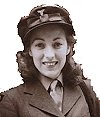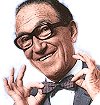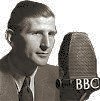BBC Radio History 1939-1945 The Home Service When WWII was declared in 1939, the BBC immediately replaced all regional medium wave programmes with a simultaneous channel called the Home Service. This 
Organist: Sandy Macpherson |
action was taken to prevent German aircraft using localised transmissions for direction finding. Early wartime programming was criticised as being old fashioned, staid and boring; with a seemingly endless cycle of light records, gramophone records, variety on gramophone records, Sandy Macpherson on the BBC organ, and first aid instructions. Indeed it was so dull that it was blamed by the Government for driving audiences to Lord Haw-Haw on Radio Hamburg! The wartime BBC found themselves with a completely new task: to keep its listeners, and to keep them happy. The BBC therefore, as a matter of new policy, began to pay more attention its audience. For The Forces So, from January 1940, in response to the criticism, existing Home Service output was supplemented by special programmes titled in Radio Times as being For the Forces which were broadcast on various existing medium wavelengths, initially by evening but soon taking up much of the daytime schedule. Extra comedy and popular music programmes were aired, now presented in a more informal almost American style. Wartime populist shows included; ITMA - It's That Man Again (1939) a comedy show based on a pirate radio ship starring Tommy Handley; The twice daily show Music While You Work (1940-1967) with a non-stop medley of popular tunes was aimed at motivating factory workers (theme tune by Eric Coates). 
Singer: Vera Lynn |
Ack-Ack Beer-Beer (1940) featuring Kenneth Horne was an entertainment programme for Anti-Aircraft and Barrage Balloon workers. Over 700 episodes were aired. Workers Playtime (1941-1964) a live lunchtime touring comedy and variety show. The show ran for 23 years. Vera Lynn s programme Sincerely Yours (1941) Introducing each programme with the signature tune "Wishing", she was a musical link between the girls "back home" and their men overseas at war, reading out personal messages and singing sentimental favourites such as "Yours", "We ll Meet Again" and "The White Cliffs Of Dover". More comedy with Hi, Gang! starring Ben Lyon (1941) The Radio Doctor (1942) Dr. Charles Hill advised listeners on how to stay healthy during wartime, Desert Island Discs (1942) which is still going strong today. A favourite irreverent comedy show, Band Waggon starring Arthur Askey ("hello playmates") continued throughout the war. The Old Town Hall variety show with Clay Keyes (Haver from Haver and Lee comedy duo) Monday Night At Seven a variety show hosted by singer Judy Shirley with the BBC Variety Orchestra; a medley of songs, sketches, jokes and a detective story to solve.  Comedian: Arthur Askey |
JB Priestley found many new fans by reading from his Novel "Let the People Sing" on the Home Service. Whitehall 1212 a police drama based on wartime murders. News Before the war, the BBC radio had broadcast no news before 7pm. This practice was the result of an early agreement with the newspaper industry. However, from 25th August 1939, with war looming, the BBC began broadcasting daily morning and lunchtime news bulletins. News readers were named on-air for the first time with Alvar Liddell, Bruce Belfrage, Stuart Hibberd, Frank Phillips and John Snagge becoming household names. There was much disquiet when Wilfred Pickles was allowed to read the news as the Yorkshire accent was not previously heard on the BBC.  News Reader: Alvar Lidell |
The evening War Report at the end of News bulletins included correspondents Richard Dimbleby, Frank Gillard and Wynford Vaughan-Thomas. Although primarily aimed at the armed forces based around Britain, the BBC Forces Programme soon became the light entertainment station of choice for the entire civilian population during the war. In February 1944 the broadcasts were renamed the General Forces Programme to coincide with the invasion of Europe. European Service On long wave, the National Programme ceased for ever in 1939, with no BBC long wave transmissions heard again until September 1941 when Droitwich radiated the BBC European Service, with news broadcasts in French, German, Italian and even in Morse Code. The Government did not encourage the British public to listen in, since propaganda and coded messages to help the war effort in Europe were included in the programmes; "the moon will be blue tonight". In fact UK radio sets were manufactured without the long wave band during the war. The European Service continued until July 1945. With the war finally over, the BBC launched a new plan to entertain and inform the British public. Onward to the Light programme. |